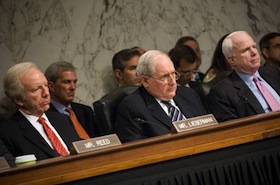Defense Bill Markup Contains Billions for Weapons, Constraints on Reductions
June 20, 2011
Featured Image
Today's top nuclear policy stories, with excerpts in bullet form.
Stories we're following today: Monday, June 20, 2011.
US Senate Panel Agrees on Defense Budget Blueprint - Jim Abrams of the Associated Press [link]
- [The Senate Armed Services Committee] completed work on the $683 billion spending blueprint Thursday at a closed meeting. Details of the legislation, which now goes to the Senate floor, were outlined Friday.
Press Release of Markup of National Defense Authorization Act for FY 2012 - Senate Armed Services Committee [link]
- Authorizes $7.6 billion for NNSA to ensure that a substantially reduced nuclear stockpile is safe, secure, and reliable.
- Authorizes $1.1 billion to continue development of the Ohio-class replacement program, SSBN(X), to modernize the sea-based leg of the nuclear deterrent system.
- Authorizes $10.3 billion for missile defense programs, including the requested level of $8.6 billion for the programs of the Missile Defense Agency and $1.7 billion for Army and related programs, a reduction of $406.6 million.
- Includes a provision that require the President to submit a net assessment to the congressional defense committees to support any proposal to reduce the nuclear weapons stockpile below the numbers in the New START Treaty or to reduce the number of hedge weapons in the stockpile.
- Includes a provision that would direct the President to submit a report describing any new Nuclear Employment Strategy if and when such a strategy is issued.
- Includes a provision that would direct the Secretary of Defense to submit an accounting report on the nuclear weapons stockpile including both deployed and non-deployed weapons.
Loss of Main Pakistani Allies Will Hurt the U.S. - Marc Ambinder in National Journal [link]
- President Obama’s decision to invade Pakistan’s sovereign territory to kill Osama bin Laden may cost both [Pakistani Army General Ashfaq Kayani and Inter-Services Intelligence chief Ahmad Shuja Pasha] their jobs … Central to the predicament facing both men are fears that the U.S. has demonstrated the capability and the willingness to safeguard its national-security interests without Pakistan’s knowledge or cooperation.
- Privately and publicly, Pakistan’s government believes that the U.S. uses the pretext of counterterrorism cooperation to spy on its nuclear facilities and personnel. An undetected raid by U.S. forces [on the Osama bin Laden compound] reinforced the degree to which Pakistan was not – or is not – prepared to defend the guarantor of its sovereignty.
IAEA Refers Syria to Security Council - Voice of America [link]
- In a 17 to six vote, with 11 countries abstaining, the IAEA passed a resolution that expressed "serious concern" about "Syria’s lack of cooperation," highlighted Syria's history of concealing nuclear activities, and noted that "the resulting absence of confidence that Syria's nuclear program is exclusively for peaceful purposes have given rise to concerns regarding the maintenance of international peace and security."
- U.S. Secretary of State Hillary Clinton welcomed the decision by the IAEA Board of Governors to report Syria's non-compliance to the Security Council.
- [White House spokesman Jay Carney said in a statement], "The United States remains determined to prevent the spread of nuclear weapons. We will work with partners and allies around the world to stand together to insist that every country meet its responsibilities or be held accountable for its actions."
View from the Dark Side
Return of the Test Ban Treaty - Owen Graham & Michaela Bendikova in The National Review Online [link]
- In 1999, the U.S. Senate properly rejected the CTBT on the grounds that it would jeopardize U.S. national security. Since then, security challenges have become far more complicated. Today, ratification is an even worse idea.
- The biggest problem with the CTBT, however, is that eliminating the testing option makes it virtually impossible to maintain a safe, reliable, and militarily effective nuclear arsenal.
- Our current nuclear arsenal is a relic of the Cold War, ill-suited for today’s multi-polar, increasingly proliferated world. We need to be modernizing our arsenal to address this reality, developing new nuclear warheads and delivery systems.
- CTBT has a trust problem, as well. It’s impossible to verify compliance with the treaty.



